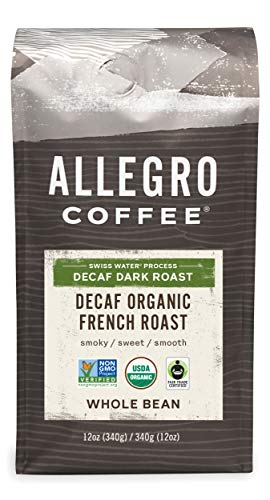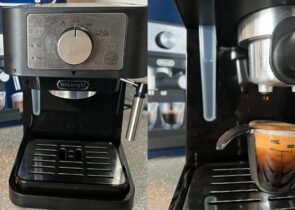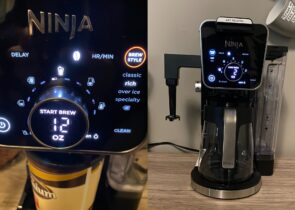Decaffeinated coffee has increased in popularity in the beverage market by leaps and bounds through the years. A recent study reveals that a specific genre of individuals prefers to choose the organic decaf coffee route rather than a traditional cup of joe.
At a Glance: Our Top 5 Picks For Best Organic Decaf Coffee
Decaf drinkers seem to be more health-conscious. They’re not heavy coffee or alcohol drinkers or regular smokers. The market has many brands for every brew method that can provide a healthy option for anyone who still wants to enjoy their coffee without the harmful side effects.
Quick Summary: Best Organic Decaf Coffee
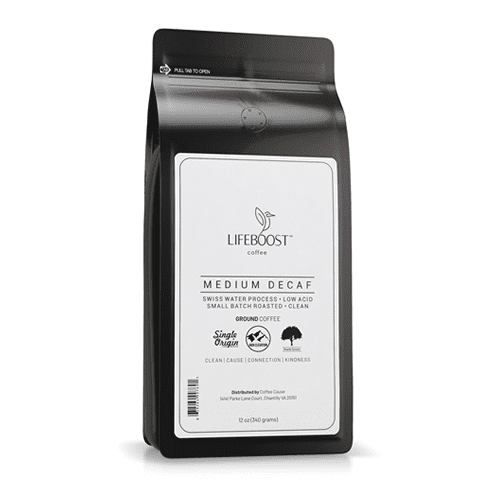 | Top Pick LIFEBOOST COFFEE – MEDIUM ROAST SWISS WATER DECAF |
| Check on Lifeboost→ |
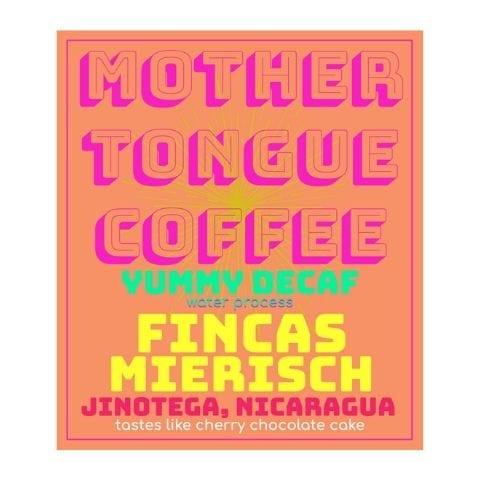 | MOTHER TONGUE COFFEE – DECAF FINCAS MIERISCH |
| Check Price → |
| No products found. | KICKAPOO ORGANIC LOW IMPACT DECAF |
| Check On Amazon → |
 | ALLEGRO COFFEE – DECAF ORGANIC FRENCH ROAST |
| Check On Amazon → |
 | VERENA STREET COFFEE – SUNDAY DRIVE DECAFFEINATED MEDIUM ROAST |
| Check on Amazon → |
Making the Organic Decaffeinated Choice
Sticking to decaffeinated coffee can be difficult, especially if you’re not fond of the flavor. In addition, if you don’t have a high-quality product in your machine at home, you may find yourself backing away from decaffeinated beans or coffee altogether.
We dug through dozens of brands to find the top five organic decaffeinated choices. They’re affordable and packed with so much flavor that you won’t even miss the caffeine.
Lifeboost Coffee – Medium Roast Swiss Water Decaf

Lifeboost Coffee - Medium Roast Swiss Water Decaf
Enjoy delicious, healthy, single origin, chemical-free, non-GMO coffee from small farms in the mountains of Nicaragua.
If you are a coffee lover, you shouldn’t have to worry about your health being affected by daily coffee consumption. Lifeboost has perfected the art of an organic cup of coffee that isn’t harmful to drink. Coffee can provide a host of benefits if it is harvested and processed without harmful additives. Lifeboost can deliver coffee beans that can make a difference in your daily decaf intake.
This is a single-origin low acid coffee using beans from the same plants on the same farms to ensure you are getting precisely what they promise. Most brands will have beans that include a mixture of beans from different plants. Unfortunately, this diversity can mean that not all of the product is 100% organic or pesticide-free. Lifeboost eliminates this possibility by only choosing single-origin beans.
Their non-GMO, chemical-free coffee beans use Swiss Water Processing to process their premium decaffeinated coffee beans straight high altitude coffee plantations in Nicaragua. There is no flavor lost with this Lifeboost Medium Roast Decaf choice. This is an excellent decaf coffee so good, you’ll forget you’re drinking coffee without caffeine. They continuously aim to provide the cleanest, healthiest coffee blends possible.
Things We Like
- They use single-origin beans for the best flavor possible
- It is a low acidity coffee that helps prevent heartburn and other digestive issues
- It is available in whole beans and grounds to suit any brewing method
Things We Don’t Like
- The minimum order is three bags, which can make trying out a new brand a larger commitment
- The cost can be higher than other premium organic blends
Kickapoo Organic Low Impact Decaf
No products found.
Kickapoo gives you whole beans roasted to order and provides some of the freshest organic coffee products to its customers. These exceptional coffee beans are grown in Peru through sustainable farming methods to ensure high-quality processing without harming the environment or their coffee beans.
This organic decaf blend from Kickapoo offers taste notes of chocolate and nuts, giving you a delicately smooth, roasted, smoky blend of flavors in every cup. They believe that even decaf coffee should taste great. They use a Mountain Water Process to remove caffeine from the beans, so you don’t have to worry about solvents or chemical processing with Kickapoo products.
Things We Like
- It contains 100% organic coffee beans from Peru
- They use Mountain Water Processing instead of chemicals for decaffeination
- They roast these bags to order
Things We Don’t Like
- It is more expensive than other organic brands on the market
- They sell only whole bean products
Mother Tongue Coffee – Decaf Fincas Mierisch
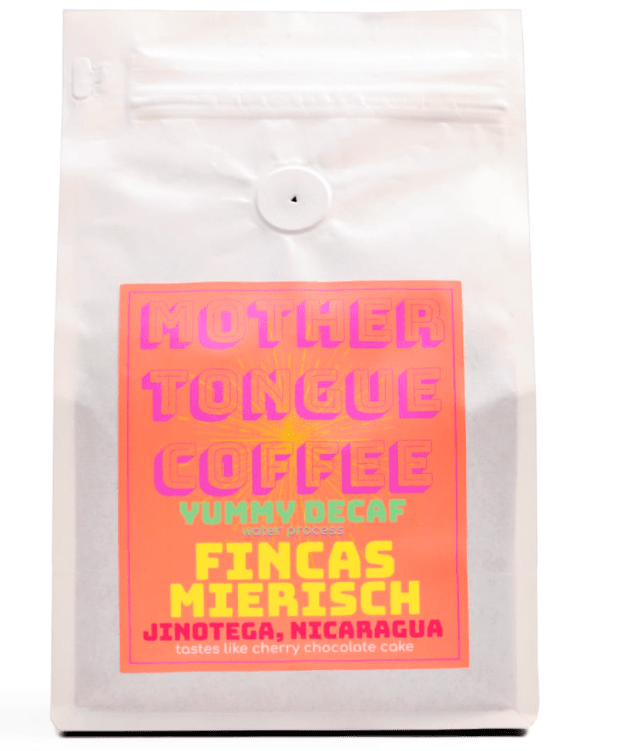
Mother Tongue Coffee - Decaf Fincas Mierisch
This Mother Tongue Coffee yummy decaf is water processed from Jinotega, Nicaragua, and tastes like cherry chocolate cake.
If you love cherry chocolate cake, you will enjoy this decaffeinated blend from Mother Tongue Coffee. The deep flavor and dark chocolate intensity of a black forest cake in liquid form, without the caffeine, is comforting and familiar.
This medium-dark roast coffee is delectably sweet and will appeal to anyone who loves a treat in their cup of joe. These organic beans are grown and harvested on coffee farms in Nicaragua. Mother Tongue uses a natural anaerobic fermenting process which gives them a sweet and juicy flavor. In addition, they use Swiss Water Processing to decaffeinate the beans before packaging.
Even after decaffeination, you still get a deep, rich cup of bold coffee. There is no flavor lost on this product during the natural decaffeination process.
Things We Like
- The sweet chocolatey flavor is like a dessert in a cup
- They use the natural Swiss Water Process for decaffeination to avoid any solvents or chemicals
- It is available as pre-ground coffee as well as whole beans to suit many different brewing methods
Things We Don’t Like
- The intense flavor can be too sweet for some coffee drinkers
- This product is a bit pricey compared to other brands
Allegro Coffee – Decaf Organic French Roast
Allegro Coffee brings you Fair Trade coffee beans from Central and South America for this Organic French Roast. The beans are Swiss Water Processed in Vancouver, British Columbia, to ensure this decaffeinated product is without chemicals.
This French Roast blend gives a hearty, sweet, and smoky aroma to your morning brew. This delicious coffee comes in a 12-ounce bag of whole beans for you to grind for use in various machines and presses. However, this Allegro Decaf Organic French Roast is not the typical blend you’ll find on store shelves.
This dark roast is so rich in flavor and aroma that coffee enthusiasts won’t even notice that it’s decaffeinated. This is not a low-budget coffee. In fact, the cost of this product is a little higher than some others on the market today, but you can save yourself a trip to your local cafe for a premium decaf coffee with this blend.
Things We Like
- A terrific bean choice for a decaf espresso without a bitter aftertaste
- It has a complex, smoky, and smooth flavor with hints of berries, black pepper, and molasses
- It has the bold, dark richness of regular coffee without the caffeine
Things We Don’t Like
- Although it’s still cheaper than going out, it does cost more than other brands
- The rich flavor notes might be too smoky and deep for some tastes
Verena Street Coffee – Sunday Drive Decaf
Verena Street Coffee gives you a touch of nostalgia with their Sunday Drive Decaffeinated Medium Roast Coffee. Containing 100% Arabica coffee beans ground and packaged into 11-ounce bags, they are certified organic and 100% Rainforest Alliance Certified.
They use the Swiss Water Process to decaffeinate their beans for this amazing coffee, so you don’t have to worry about chemical processing. This medium roast from Verena Street Coffee is flavorful and rich, yet more mellow than a dark roast option.
This kosher coffee is roasted and packaged in Iowa and is certified by the Orthodox Union. If you want a smooth, rich taste that isn’t bitter without the caffeine, the Verena Street Sunday Drive Decaffeinated Medium Roast is a terrific choice.
Things We Like
- 100% Rainforest Alliance Certified
- They use Swiss Water Processing for decaffeination
- It has a mild and more mellow taste overall
Things We Don’t Like
- This product is a medium grind coffee, which may not work well for some machines
- It contains natural and artificial flavors
The Organic and Decaffeinated Differences
Finding your favorite organic decaf ground coffee blend can be an exhausting search. There are several factors to consider when you research the numerous brands on the market today. However, if you know what to look for, you will spend less time reading about the details and more time drinking your favorite beverage.
What Does Organic Mean?
Grocery stores are practically littered with organic labels these days. When it comes to organic coffee, having the USDA Certified Organic seal means that those beans have followed a set of standardized guidelines. These requirements include:
- Grown without the use of chemicals, such as pesticides, herbicides, fungicides, or synthetic fertilizers
- Only organic fertilizers are used, such as chicken waste, coffee pulp, or compost materials
- Does not use GMO’s (Genetically Modified Organisms)
Better for the Environment
Organically grown types of coffee are better for the environment and the farmers who grow them. Without the constant use of chemical products, the air, water, and soil remain cleaner, and there are fewer health-related risks for the individuals who produce these coffee beans.
Better for Your Health
Not only does organic coffee taste better than regular chemically treated coffee, but there are numerous health benefits. For example, many individuals who cannot stomach regular coffee can drink organic blends without any side effects.
Traditional coffee processing is full of chemicals that can be absorbed by the beans and create issues when you drink them. As a result, some individuals notice digestive problems, while others may have acid reflux.
Some health benefits of organic coffee include:
- Contain more antioxidants, vitamins, and minerals, which help to boost the immune system
- Less risk of developing health issues such as cancer, high blood pressure, Parkinson’s disease, asthma, infertility, diabetes, and other diseases that result from overexposure to pesticides
- Minimizes digestive upset and acid reflux
The Decaf Processing Methods
There are several ways to process decaffeinated coffee beans. The method used will also determine the quality of the resulting coffee. The most popular ways to produce decaffeinated coffee include using chemicals, the Swiss Water Process, and carbon dioxide.
The decaffeination process happens before they roast the beans. It is easier to complete this step with green coffee beans. Unfortunately, if they roast the beans first, the result will not have the rich flavor you associate with coffee.
Chemical Soaking
With chemical soaking methods, the coffee beans soak in water. Next, they add a chemical solvent to help draw out the caffeine. This solvent can be a mixture of ethyl acetate or methylene chloride. These are both effective chemicals for removing caffeine from the beans.
They repeat this soaking process multiple times to continuously draw out the caffeine, all while keeping the beans soaking. This way, the caffeine is effectively removed, but the beans don’t lose any flavor. This solution surrounds the beans through the process to keep the flavor inside.
Next, they drain the chemical solvent, and the beans are heated to help burn off any residual solvent and caffeine, leaving decaffeinated beans ready to process. This process is considered safe according to FDA standards. As long as it meets the parts per million restrictions the FDA requires, the beans can go to market.
Some individuals will be sensitive to trace amounts of the solvent that could reside in the beans. This could make them choose Swiss Water methods or other ways to get decaffeinated coffee.
Swiss Water Process
The Swiss Water method originated in the 1930s in Switzerland as the first alternative to chemical solvent washing for decaffeination and is a healthier option than chemical decaffeination. Whole bean coffee is soaked in water, making the beans swell, so it’s easier to remove the caffeine without using harmful chemicals.
This water solution, which now begins collecting the caffeine, goes through a straining process through activated carbon filters. This step grabs the caffeine and allows natural sugars, oils, and elements of the coffee bean to remain. This mixture is used for subsequent batches to soak and withdraw the caffeine while keeping the aroma and flavors you want in your coffee beans.
Carbon Dioxide Process
Carbon dioxide is one of our natural resources that is effective at removing caffeine from coffee beans. When it is super concentrated, it can act like a gas and a liquid. This product acts as a natural solvent to extract caffeine. This is due to the properties of C02 molecules and how they bind to the caffeine molecules.
With the beans in a stable container, they blast concentrated liquid carbon dioxide at a pressure of 1,000 pounds per square inch. The highly compressed C02 is then run through a charcoal filter to separate the caffeine. This natural substance is used again on the batch of beans to ensure that anywhere from 94% to 98% of the caffeine is extracted before processing.
Carbon dioxide methods don’t remove the natural oils and other molecules from the coffee bean that alternative methods do. This way, these substances don’t have to be reinfused back into the coffee bean before processing.
FAQ
Does decaffeinated coffee have any caffeine in it?
Even though many decaffeinated processes effectively remove the caffeine molecules from the coffee beans, there may still be trace amounts. Any amount of caffeine in decaf coffee products will be minimal and will not give you the same effects that a regular cup of caffeinated coffee would. To get the same amount of caffeine from decaf as from a caffeinated beverage, you would have to drink multiple cups of coffee in one sitting.
Why would you drink decaffeinated coffee?
There are several reasons why someone would want to drink decaffeinated coffee. For example, some people are sensitive to caffeine and want to cut back their consumption.
Other individuals may want to enjoy the rich flavor of a nice cup of coffee without the caffeine if it is later in the day and it would interfere with their sleep patterns.
If you want to cut back the amount of caffeine you have each day to lower your risk of ongoing health problems, consuming decaf coffee varieties can help.
Is decaffeinated coffee bad for you?
There are some claims that decaffeinated coffee is not healthy to consume. This opinion may result from how they remove the caffeine from the beans.
Although some chemicals used in traditional methods can indeed be harmful, the parts per million trace elements that remain fall within the FDA requirements.
If you want to eliminate as many chemicals as possible from your diet and still enjoy decaffeinated coffee, choose a brand that uses Swiss Water or C02 processing instead of solvents.
The Takeaway
When you are searching for a quality organic decaffeinated coffee, you can be overwhelmed with buying choices. However, knowing the differences between the Swiss Water process and other decaffeination methods can indicate what to expect from your coffee beans and help you make a healthier choice.
Purchasing organic decaffeinated coffee can be expensive if you have a tight budget. The benefits of having organic coffee beans can mean a significant difference in your health, but if your budget doesn’t allow for high-priced products, there are still terrific options for you.
After examining these five popular brands, the one that stands out most would be the Lifeboost Coffee Medium Roast Swiss Water Decaffeinated blend. Not only is this organic decaf product made with Swiss Water processing, but it also has a smooth, mellow taste overall. Even coffee snobs will be pressed to agree that the finished coffee has a tip-top taste. Their commitment to providing chemically-free coffee products is apparent in all of their items.
For a flavorful cup of coffee that will ease your mind, so you don’t have to worry about additional caffeine or chemicals, Lifeboost Coffee is one of the best, non-GMO, pesticide-free selections in the market for your homebrew. If you want a fine grind, grab a bag of whole beans, grind them to your preference and enjoy the amazing taste of this organic product.
Everyone’s tastes can vary. Remember that if you have a product that you do not like, there are plenty of other choices out there to try. There is sure to be a brand to suit your palate without having to turn back to caffeine.
Happy Caffeinating!

